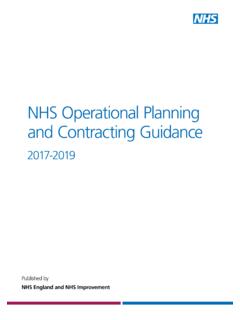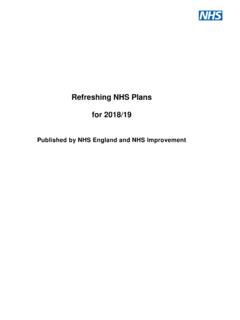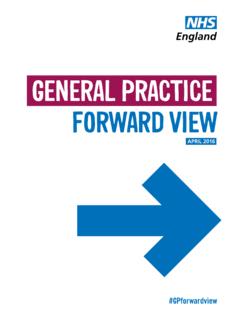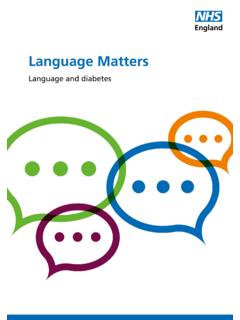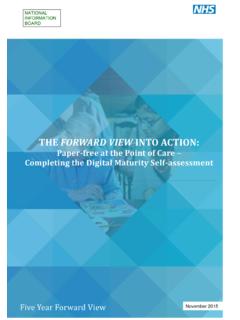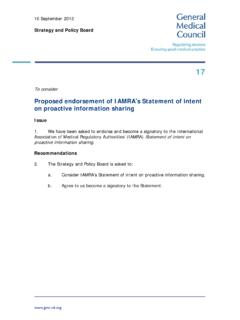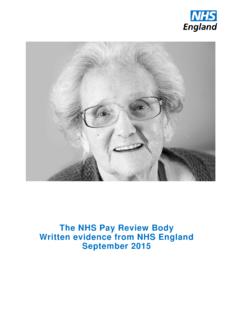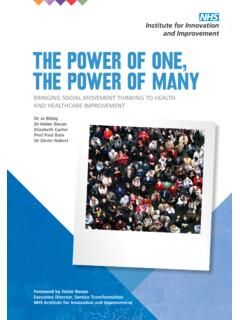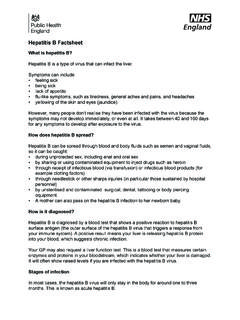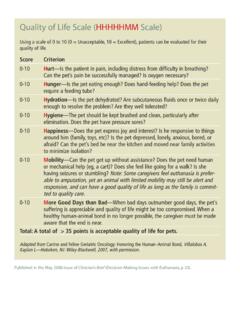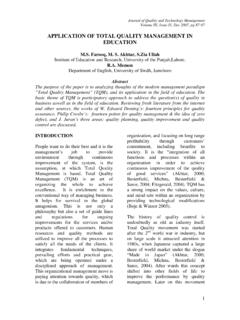Transcription of Delivering high quality end of life care for people who ...
1 Delivering high quality end of life care for people who have a learning disability Resources and tips for commissioners, service providers and health and social care staff 2 END OF life care How to use this guide Under each ambition, (see links below in contents page) those commissioning, providing or Delivering care to people with a learning disability at the end of their lives will find top tips , resources and good practice examples to support the achievement of each ambition for people with a learning disability. It is important to view all people holistically when providing end of life care . people with a learning disability, like other members of society, will have a range of characteristics that may inform their needs and expectations in relation to end of life care . For example, expectations about end of life care may be shaped by someone s ethnicity, faith, values and/or other beliefs.
2 It is important not to make assumptions about the care the person needs because of their learning disability diagnosis. Rather the aim should be to effectively engage with individuals, their families and carers to ascertain their individual needs, expectations and wishes. Please click on the links below to go directly to the relevant page in this document. This information can be made available in alternative formats, such as easy read or large print, and may be available in alternative languages, upon request. Please call 0300 311 22 33 or email 3 END OF life care Contents About this guide Page 6 Ambition 1 Each person is seen as an individual Page 9 Including the following Top Tips : Support people with a learning disability to develop their awareness about death and dying Page 9 Involve families /friends/supporters and the person s usual paid carers as partners in care Page 11 Support people to engage in Advance care Planning (ACP) (ensuring mental capacity is considered).
3 If the person is assessed as not having mental capacity to create an ACP it is still very important to ensure the person can express their end of life preferences and participate in personalised care and support planning Page 13 Remember bereavement support for those left behind is an important part of palliative and end of life care Page 16 Ambition 2 Each person gets fair access to care Page 19 Including the following Top Tips : Parallel planning in commissioning is essential, considering: - people with a learning disability when commissioning end of life care - end of life care when commissioning learning disability services Page 19 To effectively plan for the level of need and allocate appropriate resources, commissioners should make use of population data and learning disability mortality trends Page 21 When commissioning supported living services for people with a learning disability, ensure providers can deliver continuity of care throughout the lifetime of the person, and include this specification in commissioning contracts Page 23 Identify those people with a learning disability, who are in their last year of life , as early as possible Page 24 Identify and make the reasonable adjustments needed to ensure people with a learning disability can access the end of life care they need.
4 Making reasonable adjustments is a legal requirement under the Equality Act 2010 Page 26 When commissioning learning disability services, consider dementia Page 28 Ensure ALL professional groups have an awareness of end of life care in people with a learning disability (please see ambition 5) Ambition 3 Maximising comfort and wellbeing Page 29 Including the following Top Tips : Help the person to understand their illness and symptoms Page 29 Support the person to prepare for a visit to hospital or a hospice Page 31 Be creative in relieving psychological distress and improving wellbeing Page 33 Identify distress by comparing the person s current presentation to their baseline Page 36 Carry out an effective and appropriate person centred pain assessment. Ways of assessing pain for the general population may need to be adapted for people with a learning disability where communicating pain verbally may be difficult Page 37 Ambition 4 care is coordinated Page 39 Including the following Top Tips : Involve the person and families/friends/supporters and the person s usual paid carers as partners in care (see ambition 1) Page 39 Ensure the person s end of life care preferences and needs are recorded in electronic records to facilitate access by all those involved in their care and support.
5 The GP should complete the end of life planning section in the GP Health Check Action Plan following the Annual Health Check which will link to the Summary care Record. Where available, preferences should also be recorded in Electronic Palliative care Coordination Systems (EPaCCS) Page 39 Coordinate the involvement of staff from different organisations (and also the involvement of staff within the same organisation) Page 41 When commissioning end of life care for people with a learning disability include the use of local/voluntary/third sector services as well as NHS and social care services Page 43 END OF life care 4 5 END OF life care Ambition 5 All staff are prepared to care Page 44 Including the following Top Tips : Support staff and build resilience Page 44 Cross sector training is required to ensure staff working in specialist learning disability services have access to palliative and end of life care training and that those working within palliative and end of life care services receive learning disability training Page 46 Ensure ALL staff groups have an awareness that those with a learning disability may require reasonable adjustments to achieve a good end of life care experience Page 48 Staff need to have excellent communication skills and adapt these to the needs of the people they support Page 49 Ambition 6 Each community is prepared to help Page 50 Including the following Top Tips.
6 Ensure people with a learning disability are considered to be a part of the local community Page 50 Encourage discussion around death and dying amongst everyone, not just people with a learning disability Page 52 Involve charities/voluntary sector and understand their offer Page 53 How this guide was developed Page 54 List of people who assisted in development of the guide Page 55 References Page 56 6 END OF life care About this guide This top tips guide aims to support commissioners, providers and clinicians to reduce inequalities in palliative and end of life for people with a learning disability, focusing on The Ambitions for Palliative and End of life care 1. These six ambitions provide a framework for national and local health and care system leaders to take action to improve palliative and end of life care . Developed by 27 organisations across the palliative and end of life care system, these ambitions set out what high quality palliative and end of life care looks like.
7 The ambitions call on leaders from every part of the health and care system, and the wider community, to put the framework into practice. This top tips guidance has been developed by NHS England in association with the Palliative care for people with Learning Disabilities (PCPLD) Network2. The development process involved consultation with Public Health England and a range of commissioners, providers and professionals working within palliative and end of life care and learning disability settings. people with lived experience have also helped us to develop the guide. Further details of the development process can be found at the end of this document. Defining palliative and end of life care The Leadership Alliance for the care of Dying people (2014) produced a glossary of terms that includes helpful definitions of palliative and end of life care . You can find the full glossary in One chance to get it right , published on the website ( liverpool- care -pathway-review-response-t o-recommendations).
8 A summary is provided below. Palliative care Palliative care is an approach that improves the quality of life of patients and their families facing the problem associated with life -threatening illness, through the prevention and relief of suffering by means of early identification and impeccable assessment and treatment of pain and other problems, physical, psychosocial and spiritual 3. End of life care Patients are approaching the end of life when they are likely to die within the next 12 months. This includes patients whose death is imminent (expected within a few hours or days) .4 7 END OF life care Defining a learning disability Individuals with a learning disability (internationally referred to as individuals with an intellectual disability) are those who have: a significantly reduced ability to understand new or complex information, to learn new skills (impaired intelligence), with; a significantly reduced ability to cope independently (impaired adaptive and/or social functioning), and; which is apparent before adulthood is reached and has a lasting effect on development.
9 NHS England (2015)5 To meet the criteria for having a learning disability, all three categories must be met. Having a learning disability has previously been identified as an Intelligence Quotient (IQ) score in the region of 70 or below, but IQ alone should not be used to determine the presence of a learning disability. It is not appropriate to use a cut off figure of 70, as the results of a recognised IQ test require skilled interpretation. There should also be significant difficulties in adaptive and/or social functioning, for example in relation to conceptual, social and practical skills (such as language, interpersonal skills and activities of daily living). Inequality in palliative and end of life care for people with a learning disability The extent and impact of inequalities on the health of people with a learning disability have been well-documented over the years.
10 Research indicates that people with a learning disability are three times as likely to die early than the general population6. They are also more likely to experience poor general health, and to have high levels of unmet physical and mental health needs7. Health inequalities for people with a learning disability also extend into palliative and end of life care . In May 2016 the care quality Commission (CQC) published a thematic review8 into inequalities in end of life care . The review identified that people from certain groups in society sometimes experience poorer quality care at the end of their lives because providers do not always understand or fully consider their needs 9. It identified people who have a learning disability as one such group. The Confidential Inquiry into premature deaths of people with a learning disability (CIPOLD)10 found that for many people with a learning disability, who were dying, end of life care was not coordinated and the support for the person and their families could have been improved.
